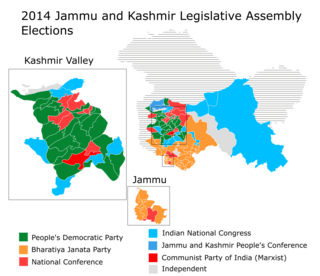
The Jammu & Kashmir National Conference (JKNC) is a regional political party in Indian-administered Kashmir's union territories of Jammu and Kashmir and Ladakh. Founded as the All Jammu and Kashmir Muslim Conference by Sheikh Abdullah and Chaudhry Ghulam Abbas in 1932 in the princely state of Jammu and Kashmir, the organisation renamed itself to "National Conference" in 1939 in order to represent all the people of the state. It supported the accession of the princely state to India in 1947. Prior to that, in 1941, a group led by Ghulam Abbas broke off from the National Conference and revived the old Muslim Conference. The revived Muslim Conference supported the accession of the princely state to Pakistan and led the movement for Azad Kashmir.

Farooq Abdullah is an Indian politician and current President of Jammu & Kashmir National Conference. He has served as the Chief Minister of Jammu and Kashmir on several occasions since 1982, and as the union minister for New and Renewable Energy between 2009 and 2014. He is the son of the 1st elected Chief Minister of Jammu and Kashmir Sheikh Abdullah, and father of former Chief Minister of Jammu and Kashmir Omar Abdullah.
In India, President's rule is the suspension of state government and imposition of direct Union government rule in a state. Under Article 356 of the Constitution of India, if a state government is unable to function according to Constitutional provisions, the Union government can take direct control of the state machinery. Subsequently, executive authority is exercised through the centrally appointed governor, who has the authority to appoint other administrators to assist them. The administrators are usually nonpartisan retired civil servants not native to the state.

Mysore State, colloquially Old Mysore, was a state within the Dominion of India and the subsequent Republic of India from 1947 until 1956. The state was formed by renaming the Kingdom of Mysore, and Bangalore replaced Mysore as the state's capital. When Parliament passed the States Reorganisation Act in 1956, Mysore State was considerably enlarged when it became a linguistically homogeneous Kannada-speaking state within the Republic of India by incorporating territories from Andhra, Bombay, Coorg, Hyderabad, and Madras States, as well as other petty fiefdoms. It was subsequently renamed Karnataka in 1973.

Article 370 of the Indian constitution gave special status to Jammu and Kashmir, a region located in the northern part of the Indian subcontinent and part of the larger region of Kashmir which has been the subject of a dispute between India, Pakistan and China since 1947. Jammu and Kashmir was administered by India as a state from 17 November 1952 to 31 October 2019, and Article 370 conferred on it the power to have a separate constitution, a state flag, and autonomy of internal administration.

Goa, Daman and Diu was a union territory of the Republic of India established in 1961 following the annexation of Portuguese India, with Maj Gen K P Candeth as its first Military Governor. The Goa portion of the territory was granted full statehood within the Indian union on 30 May 1987, Daman and Diu remained a separate territory until December 2019, when it was merged with Dadra and Nagar Haveli and is today the territory of Dadra and Nagar Haveli and Daman and Diu.

Bakshi Ghulam Mohammad (1907–1972) was an Indian politician belonging to the Jammu & Kashmir National Conference, who served as the Prime Minister of Jammu and Kashmir from 1953 to 1964. Bakshi was a member of the National Conference from its founding and rose to be the second in command to the principal leader Sheikh Abdullah. He served as the Deputy Prime Minister of the State of Jammu and Kashmir between 1947 and 1953, but disagreed with Abdullah's advocacy of independence for the state in 1953. He staged a 'coup' with the help of the Head of State Karan Singh, resulting in the dismissal and imprisonment of Sheikh Abdullah. Bakshi was the longest serving Prime Minister of Jammu and Kashmir, whose rule saw the formulation of the Constitution of Jammu and Kashmir and a normalisation of relations of Jammu and Kashmir with the Indian government.

Jammu and Kashmir is administered by the Republic of India within the framework of a federal parliamentary republic as a union territory, like the union territory of Puducherry, with a multi-party democratic system of governance. Until 2019, it was governed as a state administered by India. Politics in the region reflects the historical tension and dispute that the state has been a part of in the form of the Kashmir conflict. The head of state is the Lieutenant Governor of Jammu and Kashmir, currently Manoj Sinha, while the head of government is the Chief Minister of Jammu and Kashmir, currently vacant. Legislative power is vested in the Legislative Assembly of Jammu and Kashmir, although this was dissolved by the Governor on 21 November 2018. The judiciary is independent of the executive and the legislature.

A union territory is a type of administrative division in the Republic of India. Unlike the states of India, which have their own governments, union territories are federal territories governed, in part or in whole, by the Union Government of India. There are currently eight union territories in India, namely, Andaman and Nicobar Islands, Chandigarh, Dadra and Nagar Haveli and Daman and Diu, Delhi, Jammu and Kashmir, Ladakh, Lakshadweep and Puducherry.

The Government of Jammu and Kashmir is the governing authority of the Indian union territory of Jammu and Kashmir and its two divisions and 20 districts.
The Jammu and Kashmir Legislative Assembly, also known as the Jammu and Kashmir Vidhan Sabha is the legislature of Indian union territory of Jammu and Kashmir.

The Jammu and Kashmir Legislative Assembly election, 2014 was held in the Indian state of Jammu and Kashmir in five phases from 25 November – 20 December 2014. Voters elected 87 members to the Jammu and Kashmir Legislative Assembly, which ends its six-year term on 19 January 2020. The results were declared on 23 December 2014. Voter-verified paper audit trail (VVPAT) along with EVMs were used in 3 assembly seats out of 87 in Jammu Kashmir elections.

The Jammu and Kashmir Reorganisation Act, 2019 is an act of the parliament of India containing provisions to reconstitute the Indian-administered state of Jammu and Kashmir into two Indian-administered union territories (UTs) called Jammu and Kashmir, and Ladakh, and becoming effective on 31 October 2019. A bill for the act was introduced by the Minister of Home Affairs, Amit Shah, in the Rajya Sabha on 5 August 2019 and was passed on the same day. It was then passed by the Lok Sabha on 6 August 2019 and it received the president's assent on 9 August 2019.

Legislative Assembly elections are speculated to be held in the union territory of Jammu and Kashmir, India to elect 90 members of Jammu and Kashmir Legislative Assembly in May 2024, along with the general elections. Legally, the election shall be held no later than 30 September 2024.























